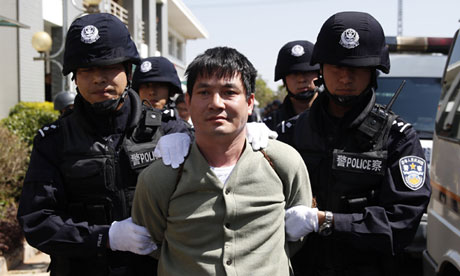China divided on TV 'execution parade': judicial resolve or crude voyeurism
Two-hour broadcast showed four foreign prisoners being led to their deaths after being charged with murder of Chinese sailors

Convicted murderer Naw Kham being led to his execution in China. Photograph: Zuma / Rex Features
Naw Kham's wry smile belied his macabre circumstances. "I haven't been able to sleep for two days. I have been thinking too much. I miss my mum. I don't want my children to be like me," the 44-year-old Burmese druglord, chained to a chair, told a Chinese TV interviewer.
On Friday – two days after the interview – the Burmese freshwater pirate was executed for allegedly murdering a crew of Chinese sailors on the Mekong river in October, 2011. His last moments were aired on state television.
In the two-hour live broadcast, black-clad police officers hauled Naw Kham from a detention centre in southern China, bound him with ropes and chains, and bundled him on to a bus bound for the execution site. Three of his alleged henchmen followed in similar fashion. They were each killed – off camera – by lethal injection.
The broadcast elicited a polarised response in China. Some saw it as a reassuring show of judicial resolve; others compared the TV special to a Mao-era "execution parade" – an unjustifiable transformation of somebody's last moments into a crude propagandistic lesson.
Experts said the broadcast, which juxtaposed Naw Kham's final march with bold displays of Chinese judicial force – armed Chinese patrol boats on the Mekong, rows of Swat police– was intended to convey an unambiguous message.
"I think [the broadcast] is compatible with what the government wants– to show the Chinese people that the government is serious about protecting them within the country and outside," said Shi Yinhong, a professor of international relations at Renmin University in Beijing.According to official accounts, the Chinese sailors were transporting fuel oil, apples and garlic along the busy Mekong shipping route in two cargo ships, the Hua Ping and the Yu Xing 8,when they were ambushed near the Golden Triangle, a notoriously lawless area bordering Thailand, Burma and Laos.
When Thai authorities reached the murder scene, they found 12 dead sailors – one on the boat, and 11 by a nearby port – some of whom had apparently been blindfolded, gagged with duct tape and shot in the head at close range. One had her neck broken. Another was missing. Nearly one million methamphetamine pills were found on board.
Chinese web users reacted to the news with horror and Chinese authorities sent gunboats down the Mekong, causing some to question China's long-standing foreign policy of non-interference in other countries' domestic affairs. Shipping on the river briefly came to a halt.
Naw Kahm soon emerged as a prime suspect. China's official media portrayed the manhunt to find him – a cross-border effort involving 200 people – as similar to the US search for Osama bin Laden. The state-run Global Times reported last month that China's drug enforcement authorities considered using an unprecedented drone strike to bomb him out of his mountain hideaway in north-eastern Burma. He was captured in Laos last spring and promptly extradited.
State media identified Naw Kham's three henchmen as Hsang Kham from Thailand, Zha Xika from Laos and Yi Lai of "unknown origin". The four prisoners were sentenced to death last autumn for intentional homicide, drug trafficking, kidnapping and hijacking.
A high provincial court rejected their appeals, yet a Reuters investigation in early 2012 cast doubt on the allegations and raised the possibility thata nine-man anti-narcotics unit within the Thai military was responsible for the massacre.
On China's most popular microblogging site, Sina Weibo, response to the execution were firmly divided. Some users praised the government's hard line on crimes against Chinese citizens abroad; others decried the live broadcast as unnecessarily cruel and voyeuristic.
Lawyer Tao Jiamei called it an infringement of China's own criminal procedure law, which dictates that executions "should be announced, but should not be publicly exposed".
Nicholas Bequelin, a Hong Kong-based senior researcher for Human Rights Watch, said public executions were fairly common in China until the early to mid-1990s. They were formally banned in 1979. "Sometimes, in the early days, people were executed right away in stadiums," he said. "Then the practice actually shifted to taking these people away, generally on a truck, to be executed elsewhere."
Human rights groups say China executes up to 8,000 people per year. The exact number is considered a state secret.
*This feeds directly into the cultural Communist Chinese [programmed] passion, for viewing human/animal cruelty & horror
No comments:
Post a Comment
Comments always welcome!